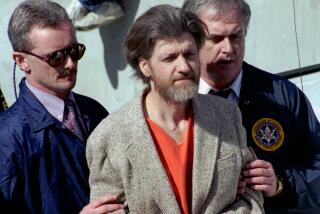A Hard Spot for Justice
- Share via
Unabomber suspect Theodore Kaczynski’s reported attempt to hang himself with his underwear in a Sacramento jail cell has set this bizarre and dramatic case on an awkward path. Kaczynski has agreed, finally, to undergo psychiatric testing. He is doing so in a bid to serve as his own attorney against charges that he built bombs that killed two men and maimed two. Whatever the tests show, the process is proper. It will be fair to Kaczynski in helping to determine whether he is capable of defending himself. And moving this trial along will address the surviving victims’ quest for justice.
The question of mental illness has been at the center of the Unabomber case from the outset. From the first bomb planted at Northwestern University 20 years ago, investigators assumed they were on the track of a cunning but deranged assailant.
Dramatically, the arrest of Kaczynski came after a younger sibling compared a long Unabomber screed published in the press to other writings of the accused. Brother turned in brother, insisting that Theodore Kaczynski was unbalanced and should be given proper treatment.
But in pretrial maneuverings, Kaczynski has fought any suggestion that he has mental problems. He now insists that he is sufficiently competent to handle his own defense, without the help of professional counsel. His lawyers, with whom he has strongly disagreed, had been prepared to put on a defense that their client suffers paranoid schizophrenia.
U.S. District Judge Garland Burrell Jr. on Thursday agreed to consider the defendant’s request to be his own lawyer and ordered an indefinite delay in the trial. Kaczynski agreed to undergo psychiatric evaluation of his competency to stand trial. There was no discussion in court of the reported suicide attempt, which is believed to have occurred the previous night.
There are uncomfortable echoes of the trial of Colin Ferguson, who defended himself in the fatal shooting of six people on the Long Island Rail Road. He flooded the court with nonsensical arguments, including one that he was charged with 93 counts because the attack occurred in 1993. He was convicted after a trial that was called “a theater of the mentally ill” by one of the lawyers whom Ferguson fired.
Judy Clarke, one of Kaczynski’s lawyers, said a mental illness defense is a “situation in which he simply cannot endure.” Perhaps, but if this long drama were to end in farce with the courtroom ravings of an unbalanced defendant, the character of justice would not be served. Judge Burrell is in a tough spot, caught between what would appear to be common sense and constitutional protections for a defendant. He will need all of his judicial skills to reach a just end.
More to Read
Sign up for Essential California
The most important California stories and recommendations in your inbox every morning.
You may occasionally receive promotional content from the Los Angeles Times.













